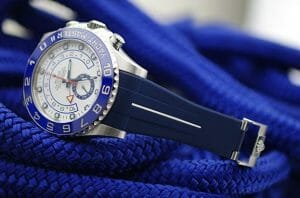
Over the past century, Rolex has achieved many milestones in watchmaking that have cemented the company as one of the leaders in luxury watch market. One of their most enduring innovations is the hermetically constructed Oyster case that was introduced in 1927. Consisting of a solid middle case, screw-down case back and friction-fitted crystal and bezel, the Oyster guarantees a depth rating of 100 meters on all models.
The middle case is stamped out of a solid block of 904L stainless steel or precious metal with the case back featuring the characteristic fluting that creates a tight seal. A special tool is required to remove the case back and access the movement inside. The sapphire crystal is mounted on a gasket and fitted against the flange of the case. It is then clamped tight by the bezel or a sealing ring.
After the case is constructed and the watch is completed, it undergoes stringent testing in-house before going out to dealers. They are immersed in water and subjected to pressure that is 10 percent greater than the pressure found at the guaranteed depth of the watch. This ensures quality control and allows the watchmaker to guarantee their products without concern about reliability after the watch leaves the manufacture.
The shape of the Oyster case is often imitated, but its construction is something that only Rolex can offer. This sturdy case has been around for longer than most of their iconic models and shows no signs of going away. Aside from the Cyclops lens, it is perhaps the most visible symbol of Rolex’s commitment to innovation in watchmaking. For more information on this and other features, visit rolex.com.


















